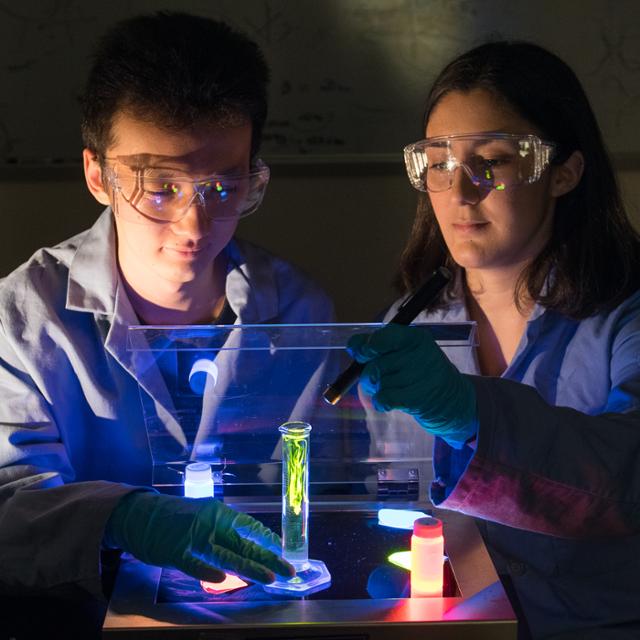Doctorate Programs

The Department of Physics & Astronomy offers Physics, Astrophysics, and Biophysics tracks to the Ph.D., as well as a Ph.D. with Business option. All programs are characterized by close interactions between faculty members and students. A course of study and research is designed specifically for the background and career objectives of each student.
Currently ten faculty members teach and direct the research of about fourteen full-time and four part-time Ph.D. students. Small lecture classes averaging typically 4-8 students enable frequent, direct contact between graduate students and faculty members. Dissertation research involves close collaboration between a student and a professor working on a challenging research problem. Participation in research is encouraged to begin during the first semester of graduate study. Our Ph.D. graduates have enjoyed remarkable professional success in a wide variety of careers in teaching and research at universities and colleges, in industrial and government research laboratories, and in high technology businesses.
The Department has research programs in computational and observational astronomy (galaxy dynamical and chemical evolution for nearby galaxies, including the Milky Way and its satellite galaxies), computational biophysics (modeling disease processes and therapies), experimental biophysics (fluorescence spectroscopy, nanophotonics plasmonics, and cancer detection), experimental optoelectronic and structural properties of ZnO-based devices, fluorescent nanodiamonds and silicon carbide nanowires. Each research area provides excellent opportunities for students to master a variety of useful research skills and to obtain practical experience that will prepare them for careers in industry, government, or academia. Our research programs have been supported by NSF, the Department of Energy, NIH, NASA, Research Corporation, the Welch Foundation, the W.M. Keck Foundation, the Petroleum Research Fund, and companies such as Chevron, Exxon, and the Sid Richardson Carbon Black Co. TCU is also member of the Sloan Digital Sky Survey (SDSS-V).
If you are interested in a Ph.D. and think that you too could benefit from an individualized program of research and study with the close personal attention of our faculty, we invite you to apply for admission and financial support. Most student are support by departmental teaching assistantship that cover full tuition plus a 12-month stipend. Admitted students with support are guaranteed 5 years of funding, given acceptable progress through the program (e.g., passing classes/exams, advancement to candidacy). Stipends for new students are anticipated to be $29,000 are for 12 months, plus full tuition. Teaching assignments in undergraduate laboratories are limited to 2-3 sections (about 10 hours) per week. Additionally, some part-time and full-time research assistantships are available for qualified students working on faculty grants. Average time to complete the Ph.D. degree is 5 years.
TCU is a founding member of the Texas Space Grant Consortium, which has a program of Graduate Fellowships for which qualified applicants to the Ph.D. program can apply. TCU is also a member of Oak Ridge Associated Universities, and opportunities exist for research at Oak Ridge and affiliated national laboratories.
The TCU Physics & Astronomy department will not consider General GRE nor Physics GRE scores as part of our admissions process. There is no application fee for US citizens and permanent residents. For international students the fee is $60, but interested students may contact the Graduate Director, Dr. Peter Frinchaboy (p.frinchaboy@tcu.edu) to apply for a limited number of fee waivers. Please include a copy of your CV if you are seeking a fee waiver.
The nominal deadline for completion of the application for Fall is February 1st, though later applications may be considered.
The TCU Physics & Astronomy Department conducts pre-admissions interviews. You will be notified if selected for an interview. Questions will focus on your research, preparation for graduate school, and interest in attending TCU. Please note that not all admitted applicants will be interviewed prior to acceptance, and that an interview does not guarantee admissions.
Doctor of Philosophy, Physics
Doctor of Philosophy, Physics (Astrophysics Option)
Courses & Requirements
Doctor of Philosophy, Physics (Biophysics Option)
Courses & Requirements
Doctor of Philosophy, Physics (Business Option)
Courses & Requirements
Applicants
The normal prerequisite for admission to the graduate program is the successful completion of a BS degree with a major in physics, astronomy or a closely related field with a GPA of at least 3.0 (on a 4.0 scale). The undergraduate course work is expected to include junior/senior level physics courses in mechanics, thermal physics, electricity and magnetism, quantum mechanics; mathematics courses through differential equations; and a course or experience in computer programming. Additional courses in mathematics including advanced calculus and linear algebra, and senior level physics courses such as modern optics, atomic and nuclear physics, or solid state physics are desirable. Students who do not have the equivalents of the above may take the courses at TCU prior to entering the graduate core courses.